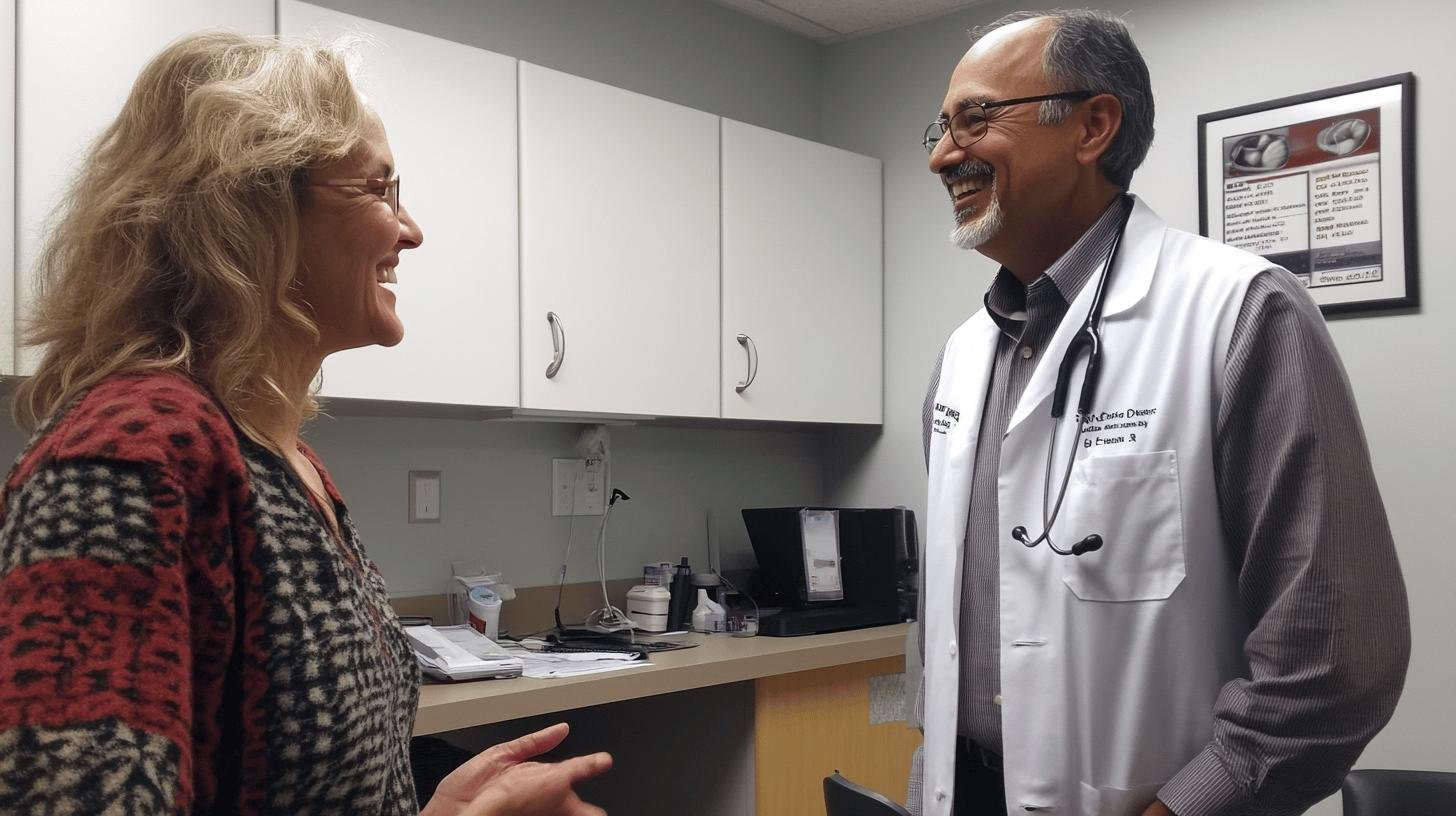TL;DR:
- Direct Primary Care (DPC): Bypass insurance for direct patient-provider relationships with a regular fee covering many services.
- Primary Benefits: Transparent costs, extended appointments, direct access, holistic care, and fewer patients per doctor for personalized attention.
- Mental Health Integration: DPC integrates mental health services, allowing for extended consultations and comprehensive care.
- Provider Examples: Strada Healthcare offers $99/month for unlimited care with no-risk membership.
- Cost Benefits: Lower overhead and transparent pricing prevent surprise bills, focusing on preventive care.
- Accessibility: DPC facilitates flexible scheduling, telehealth, and immediate access, enhancing mental health service convenience.
Have you ever felt like getting mental health care is a maze? What if I told you there’s an easier way to get the help you need without the endless insurance headaches? Direct Primary Care (DPC) isn’t just for your physical health—it’s also a game-changer for mental health services. Imagine having unlimited time with your doctor, who knows your story and cares about your well-being. Stick around to learn how DPC blends primary care and mental health into one seamless package, and why this model could be the key to better healthcare for you and your family.
Understanding Direct Primary Care
Direct Primary Care (DPC) is revolutionizing healthcare. It creates a direct financial and personal relationship between patients and primary care providers bypassing traditional insurance models. Patients pay a regular fee—monthly, quarterly, or annually. This fee covers many primary care services, including clinical visits, lab work, consultations, care coordination, and comprehensive care management. DPC’s simplicity and transparency make it easier for patients to manage their healthcare without the headaches of insurance.
Primary Benefits of DPC:
- Transparency in Costs: There are no hidden fees or surprise bills. You know exactly what you’re paying for.
- Extended Appointments: Quality time with your doctor means better care and understanding of your health needs.
- Direct Access: Reach your doctor via phone, email, or telemedicine anytime, no more waiting for appointments.
- Holistic Care: Focuses on overall wellness, not just treating symptoms.
- Fewer Patients Per Doctor: This means more personalized care and attention.
Traditional healthcare models often fall short of providing comprehensive care. Time constraints and limited patient-provider interaction are common issues, leading to a fragmented healthcare experience. In contrast, DPC allows for extended patient visits, enabling better management of complex health issues.
By removing the middleman—insurance companies—DPC providers can focus solely on patient care. This results in more personalized, effective treatment plans that cater to individual needs. Plus, the reduced administrative burden means doctors can spend less time on paperwork and more time with you.
Mental Health Services Within Direct Primary Care

Direct Primary Care (DPC) is breaking new ground by integrating mental health services into its model. Unlike conventional healthcare systems, DPC offers extended consultation times. This allows for a deeper understanding of a patient’s mental health needs. This approach treats individuals holistically, focusing on comprehensive mental health care rather than just symptoms.
Psychologists within DPC play a crucial role in mental health management. They offer psychotherapy, psychological testing, and behavioral interventions. This means you can get therapy and mental health assessments without the usual red tape. Extended visit times in DPC allow psychologists to dig deeper into your mental health history and provide more personalized care. Imagine having the time to discuss everything on your mind without feeling rushed.
Psychiatrists in DPC can prescribe medications and perform physical examinations. This is a game-changer because it means your mental and physical health needs are met under one roof. The holistic care approach of DPC ensures that your mental health is not treated in isolation but considered part of your overall well-being. This integrated care model can lead to more effective treatment plans and better health outcomes.
The Benefits of Combining Primary Care and Mental Health Services in DPC
DPC’s holistic approach to health, integrating mental health services seamlessly means your doctor doesn’t just look at isolated symptoms but considers your overall well-being. They’re tuned into your lifestyle, environmental factors, and mental health history, which allows them to develop personalized treatment plans. When your mental and physical health are treated together, the results can be transformative.
One standout feature of DPC is the extended patient-provider interaction. Unlike traditional healthcare models where time is limited, DPC offers longer appointments. This extra time helps reduce the stigma around mental health because you can discuss your concerns openly without rushing. Personal care leads to more effective treatment plans, tailored specifically for you.
Real-World Examples of DPC’s Effectiveness:
- Integrated services for depression, including medication management and counseling.
- Flexible care options for anxiety are available through in-person and telehealth consultations.
- Comprehensive wellness plans that incorporate both physical and mental health check-ups.
- Ongoing support for chronic mental health conditions, ensuring continuous care.
- Immediate access to mental health professionals without long waiting periods.
The patient-provider interaction in DPC is unlike any other. With fewer patients, doctors can offer more personalized care. This close relationship means your doctor gets to know you and understands the full picture of your health, they can make better decisions which can lead to more accurate diagnoses and effective treatments. This approach improves your physical and mental well-being making DPC a win-win for comprehensive care.
How to Find Direct Primary Care Providers Offering Mental Health Services

A DPC provider offering mental health services can significantly improve your overall well-being. Many DPC practices now integrate mental health services/consultations into their regular services. This means you can discuss your mental health concerns during routine check-ups, ensuring a holistic approach to your care. Providers like Strada Healthcare offer accessible, affordable, and no-risk memberships.
Key Features to Look for in a DPC Provider:
- Integrated Mental Health Services: Ensure the provider includes mental health consultations and treatments.
- Transparent Pricing: Look for clear, all-inclusive membership fees without hidden costs.
- Flexible Access: Providers should offer multiple ways to reach them, like telehealth, email, and phone consultations.
- Patient-Centered Care: The provider should prioritize your overall well-being with personalized treatment plans.
Strada Healthcare stands out by offering an adult membership at $99 per month. This fee covers unlimited care and personalized treatment, making it more affordable than traditional mental health talk therapy sessions. Plus, they allow patients to quit their membership anytime without fees or penalties, ensuring a no-risk commitment. If you’re looking for accessible mental health care, Strada Healthcare’s DPC model is a solid choice.
Cost and Accessibility of Mental Health Services in Direct Primary Care
Direct Primary Care (DPC) significantly boosts accessibility and convenience for mental health services. With flexible appointment scheduling and telehealth options, DPC is a game-changer for patients with mobility issues or those living in remote areas. Imagine not having to drive miles to see a specialist or wait weeks for an appointment. DPC’s model allows you to connect with your provider from the comfort of your home, making it easier to address mental health concerns promptly. This not only saves time but also ensures you get the care you need when you need it.
Cost Benefits of DPC:
- Lower Overhead Costs: Eliminating insurance billing reduces administrative expenses, making healthcare more affordable.
- Preventive Care Focus: Early intervention and regular check-ups can prevent more severe health issues, saving you money in the long run.
- Transparent Pricing: You pay a fixed monthly fee, so no surprise bills or hidden costs.
Case Studies and Testimonials on Direct Primary Care and Mental Health Services

Case studies are crucial in healthcare. They show real-world examples of how different models work. In Direct Primary Care (DPC), case studies highlight the effectiveness of integrating mental health services. By looking at actual cases, you can see how DPC helps with issues like depression and anxiety. This isn’t just theory; it’s practical evidence that proves DPC is making a difference.
A specific case study about Strada Healthcare offers a great example of how DPC can provide personalized and accessible mental health care. One of their patients struggled with depression for years. Traditional healthcare models left them feeling rushed and unheard. But with Strada’s DPC model, the patient got extended visits, allowing for deeper conversations. Medication management and counseling were seamlessly integrated into their care plan. The result? Significant improvement in their mental health, thanks to the holistic approach of DPC.
Patient Testimonial
One patient shared their positive experience with DPC mental health services. They mentioned how personalized care made all the difference. With flexible appointment options and direct access to their doctor, they felt supported every step of the way. This kind of patient-centered care shows just how effective DPC can be in improving mental health outcomes.
Final Words
Direct primary care offers a refreshing approach to healthcare with a focus on personalized treatment and accessibility.
We’ve dug into how DPC works, covering most primary care services for a low fee.
We’ve also explored how mental health services fit seamlessly into this model, with psychologists and psychiatrists providing comprehensive care.
Combining primary care and mental health services under DPC leads to better patient outcomes and a more holistic approach to health.
So, consider this model for a more engaging and effective healthcare experience.
Stay positive and healthy!
FAQ
What is the meaning of direct primary care?
Direct Primary Care (DPC) establishes a direct financial and personal relationship between patients and primary care providers, bypassing traditional insurance models.
What is the role of primary care in mental health?
Primary care in mental health involves extended consultation times that allow a deeper understanding of a patient’s needs and holistic care that focuses on overall mental health, beyond just treating symptoms.
Does Florida have free mental health services?
Florida has various programs and agencies that provide free or low-cost mental health services based on need and eligibility.
What does direct primary mean in insurance?
Direct primary means patients pay a monthly, quarterly, or annual fee for primary care services, eliminating the need for traditional insurance for those services.

